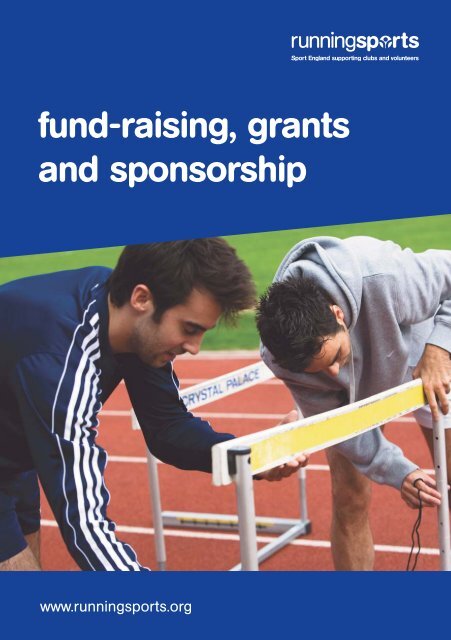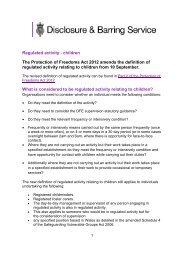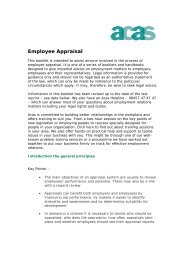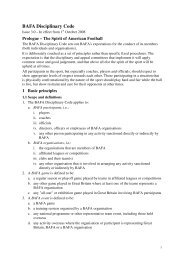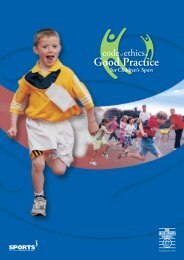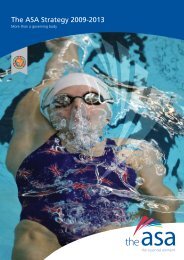Fund-raising, Grants And Sponsorship - Sport and Recreation Alliance
Fund-raising, Grants And Sponsorship - Sport and Recreation Alliance
Fund-raising, Grants And Sponsorship - Sport and Recreation Alliance
- No tags were found...
You also want an ePaper? Increase the reach of your titles
YUMPU automatically turns print PDFs into web optimized ePapers that Google loves.
effective communication 1fund-<strong>raising</strong>, grants<strong>and</strong> sponsorshipwww.runningsports.org
what is runningsports?The runningsports programme has been created, <strong>and</strong> is funded, by <strong>Sport</strong> Engl<strong>and</strong> for the benefitof volunteers working in sport.The runningsports programme provides products <strong>and</strong> services in a variety of formats to supportthe work undertaken by volunteers <strong>and</strong> sports development officers. From Role Outlines, Top Tips<strong>and</strong> Quick Guides through to workbooks, workshops, e-learning <strong>and</strong> qualifications, the range ofresources supports three key themes of club <strong>and</strong> volunteer development:governance <strong>and</strong> administrationfinance <strong>and</strong> fundingvolunteers <strong>and</strong> volunteer management.For further information about runningsports, visitwww.runningsports.orgor call 0800-363 373.Throughout this Quick Guide, reference is made to ‘clubs’. This term is used to include all sports organisations,such as leagues, county <strong>and</strong> area associations <strong>and</strong> other community groups, that provide opportunities, whether inan organised setting or a more informal environment.The term ‘parent’ includes carers, guardians <strong>and</strong> other next-of-kin categories.Photographs are courtesy of <strong>Sport</strong> Engl<strong>and</strong> unless otherwise stated.Designed <strong>and</strong> produced by Coachwise Ltd 90651:21
contentswhat does a fund-raiser do? 1assessing your needs 2how to raise money 2fund-<strong>raising</strong> ideas 3Community Amateur <strong>Sport</strong>s Clubs (CASCs) <strong>and</strong> charitable clubs 4donations <strong>and</strong> membership 10grant applications <strong>and</strong> loans 11<strong>Sport</strong> Engl<strong>and</strong> sources of funding 12sponsorship 13marketing 16promotion <strong>and</strong> publicity 19sources of funding <strong>and</strong> advice 20useful contacts 23more help from runningsports 25fund-<strong>raising</strong>, grants <strong>and</strong> sponsorship 1what does a fund-raiser do?The role of the fund-raiser is to promote,market <strong>and</strong> raise awareness of a club inorder to increase its funds throughsponsorship <strong>and</strong> the establishment oflong-term fund-<strong>raising</strong> relationships. Therole also consists of developing new <strong>and</strong>imaginative fund-<strong>raising</strong> ideas, some of whichmay mean working with different media topromote <strong>and</strong> market your club, <strong>and</strong> obtaininggrants where relevant.Here is a summary of some of the key tasksthe fund-raiser may take on directly, ordelegate to other members of the committee:identify where funding is requiredbuild <strong>and</strong> maintain long-termfund-<strong>raising</strong> relationshipsidentify <strong>and</strong> approach potentialsponsors/donorsraise awarenesswork with media outlets to promote,market <strong>and</strong> advertise forthcoming eventsengage club <strong>and</strong> organisation members infund-<strong>raising</strong> activitieswrite reportsmanage <strong>and</strong> update databasesliaise with the treasurer.A good fund-raiser will be:able to research, plan <strong>and</strong>devise strategiesconfident <strong>and</strong> an effective communicatorable to act as spokesperson foryour organisationidentify <strong>and</strong> seek potentialfunding opportunities
2 fund-<strong>raising</strong>, grants <strong>and</strong> sponsorshipcomputer literate <strong>and</strong> have a workingknowledge of Microsoft Word <strong>and</strong> Excel(spreadsheets are helpful)creative <strong>and</strong> innovativeenthusiasticmotivatedable to remain positive in stressful situationsflexible <strong>and</strong> adaptablecapable of undertaking research.assessing your needsBefore you start to raise funds, you needto consider:how much money you currently havewhat you want money forhow much extra money you needwhat the best way of <strong>raising</strong> funds is.Specific areas within your club, where funding isrequired, need to be identified to ascertain howmuch funding you need to raise <strong>and</strong> whatmethods you need to use to raise it. Forexample, it could be that you need additionalsports equipment <strong>and</strong>, by hosting a raffle or asmall event, enough would be raised toaccomplish your budgetary goal. On the otherh<strong>and</strong>, you may need to purchase a new bus fortransport purposes, in which case your financialtarget would be somewhat larger <strong>and</strong> mayrequire more substantial sponsorship or a grant.how to raise money<strong>Fund</strong>-<strong>raising</strong> is the art of getting money forspecific projects or club activities. There aremany ways of <strong>raising</strong> money, including:membership subscriptionsseeking donationsobtaining grantsorganising fund-<strong>raising</strong> eventsrunning lotteriesobtaining sponsorship.The fund-raiser must know:what makes organisations worthy of supporthow to tell people about the value oftheir causehow to identify various people <strong>and</strong>organisations that might donate to themhow to reach these potential supportershow to get an immediate <strong>and</strong>helpful response.
fund-<strong>raising</strong>, grants <strong>and</strong> sponsorship 3fund-<strong>raising</strong> ideas<strong>Fund</strong>-<strong>raising</strong> ideas seem only to be limited bypeople’s imagination. Here are somesuggestions to get you started:social eventsAntiques roadshowBowling eventBreakfast/brunch partyCar rallyCasino eveningCeilidh (country/folk dance night)Coffee morningConcertDiscoDuck raceGala or celebrity sports dinnerProgressive meals (from one house to thenext – charge for food)Quiz or race nightSkittles eveningTalent or fashion showThemed party (eg Halloween, Easter,murder mystery evenings)Wine tasting.sponsored eventsGiving up chocolate, sweets, fizzydrinks etcGrowing/removing moustaches/beards/hair on legs etcMarathon game/dance/juggle etcOne-day fastPram pushRecord-breaking attemptsSilenceSwim/walk/run/hop/three-legged run/cycle etcToddle.other eventsAuction (post-event mini-auction)Bring-<strong>and</strong>-buy saleButtons <strong>and</strong> pins/badges saleCake-making competitionCar boot saleCar parking (for event)Car showCar washCelebrity autograph/photo sessionDonations in lieu of gifts for birthdays,weddings, anniversaries, in memory ofloved ones etc
4 fund-<strong>raising</strong>, grants <strong>and</strong> sponsorshipFlea marketGarage saleLotteryMile of pennies/10 pencesRaffleSecond-h<strong>and</strong> kit saleSouvenir sports books/programmes sale.using facilities <strong>and</strong>programmes toraise moneyInstall vending/drinks machinesPublish a cookbook/poetrybook/joke bookRent out facilitiesSell programmeadvertisement spaceSell space on perimeteradvertising boards.Community Amateur <strong>Sport</strong>s Clubs(CASCs) <strong>and</strong> charitable clubsTwo means of gaining tax concessions exist forsports clubs. A sports club can achieve eitherCASC status (registered with HM Revenue &Customs – HMRC) or charitable status(registered with the Charity Commission inEngl<strong>and</strong> <strong>and</strong> Wales, the Office of the CharityRegulator in Scotl<strong>and</strong>, <strong>and</strong> The Department forSocial Development in Northern Irel<strong>and</strong>). Thereis a new ‘fit <strong>and</strong> proper persons’ test for sportsclubs to satisfy before they are entitled to getthe tax benefits available to a charity or CASC.This test broadly requires that the club’sfinancial managers should be fit <strong>and</strong> properpersons, normally a condition that should notbe difficult to satisfy.CASCsThe CASC scheme recognises the importantrole played by sports clubs in local communities<strong>and</strong> is able to differentiate between clubs <strong>and</strong>businesses for rates <strong>and</strong> tax purposes.Registered CASCs have the opportunity toclaim 80% m<strong>and</strong>atory rate relief on businessrates. Local authorities can also grant an extra20% rate relief to clubs at their discretion.The initiative is an opportunity to keep moneyin the sport <strong>and</strong> recreation sector.Financial consultants Deloitte’s figures showthat, to date, over 5500 clubs have registeredfor CASC status. Many clubs have financiallybenefited from rate relief <strong>and</strong> Gift Aid ondonations or fund-<strong>raising</strong>, making an estimatedsaving of nearly £80 million since 2002.
fund-<strong>raising</strong>, grants <strong>and</strong> sponsorship 5Key benefits:Clubs gain a m<strong>and</strong>atory 80% raterelief (funded by central government).Local authorities can grant a further20% rate relief.Clubs receive Gift Aid on donationsfrom individuals by reclaiming 28pof every £1 donated. From 2011,this will reduce to 25p for every£1 donated.Clubs are exempt fromCorporation Tax on bank <strong>and</strong>building society interest.Clubs gain exemptions fromCorporation Tax on profits fromtrading <strong>and</strong> fund-<strong>raising</strong>, wheregross income is less than £30,000per annum, <strong>and</strong> from income fromproperty, where gross income isless than £20,000 per annum.Clubs are exempt from CorporationTax on chargeable gains.To read more about the benefits CASCstatus could offer your club, go towww.cascinfo.co.ukhow to qualify forCASC statusThe club’s governing documents (constitution,memor<strong>and</strong>um, articles <strong>and</strong> club rules) mustmake explicit the following four principles,relating to how the club is run:There must be a policy of openmembership, <strong>and</strong> the club must notdiscriminate in terms of sex, race, religion,ability etc.The core purpose of the club must be topromote one or more sports/activities.The club must be non-profit-making <strong>and</strong>any surplus profits must be reinvested intothe club.There must be a dissolution clause statingthat, in the event of the club being woundup, any remaining assets will bedistributed to either the governing body ofthe sport(s), a charity or another CASC.how to apply forCASC statusYou will need to send the following to HMRC:a completed application forma copy of the club’s governing documentsa copy of the club’s latest accountsa copy of any prospectus, member’sh<strong>and</strong>book, rule book <strong>and</strong> any otherrelevant document.runningsports runs a workshop on CASCcalled ‘How to Get Tax Breaks for Your Club’.Contact runningsports for further details, orvisit www.runningsports.org
6 fund-<strong>raising</strong>, grants <strong>and</strong> sponsorshipcharitable statusHaving charitable status can result insubstantial benefits. These include:80% m<strong>and</strong>atory business rate relief onpremises used wholly or mainly forcharitable purposes (plus a further possible20% discretionary relief)the potential to avoid payingIncome/Corporation Tax (in the case ofsome types of income), Capital Gains Taxor Stamp Duty, <strong>and</strong> gifts to charities arefree of Inheritance taxspecial Value Added Tax (VAT) treatment, insome circumstancesthe ability to raise funds from the public,grant-making trusts <strong>and</strong> local governmentmore easily than non-charitable bodiesthe ability to raise extra income through GiftAid, if you are a charity. For each £1 givenby an individual, 28p can be recovered bythe charity from HMRC. From 2011, this willreduce to 25p for every £1 donated.Most of the tax exemptions apply only tothe extent to which income is applied forcharitable purposes.Obtaining charitable status can be quite difficultfor clubs, although some of the activities theyoffer may qualify. Historically, the basicrequirement was to be established for one ofthe following qualifying charitable purposes:the relief of povertythe advancement of educationthe advancement of religionThe Charities Act 2006 extended thesepurposes <strong>and</strong> builds on the existing terms foramateur clubs. Since 2008, it has helped tospeed up the gaining of charitable status foramateur sport.Historically, clubs could qualify for charitablestatus under the <strong>Recreation</strong>al Charities Act1958. The provision of facilities for recreation orleisure time will normally be accepted as beingexclusively charitable if they are provided:for public benefitin the interests of social welfarewith the intention of improving quality of life.Additionally, if your club has a youth section, itcould ensure it is independently organised, withan appropriate constitution, so that it comeswithin the educational charitable purpose (ie itis providing facilities that assist in the physicaleducation <strong>and</strong> development of young people).Since November 2001, clubs have been able toregister as a charity if they promote communityparticipation in healthy recreation, by providingfacilities for playing particular sports. In order toqualify, membership must be open to the wholecommunity, without discrimination <strong>and</strong> withaffordable membership fees. Facilities shouldbe available to all members. These continueto be the qualifying conditions post-CharitiesAct 2006.Further guidance on this subject can beobtained from leaflet RR11 ‘Charitable Status<strong>and</strong> <strong>Sport</strong>’, published by the CharityCommission. To view a copy, visit the CharityCommission website atwww.charitycommission.gov.uk/publications/rr11.aspxother purposes beneficial to the communityin relation to the provisions of the<strong>Recreation</strong>al Charities Act 1958.
fund-<strong>raising</strong>, grants <strong>and</strong> sponsorship 7There are restrictions on what charities can do,both in terms of the types of work they do, <strong>and</strong>the ways in which they can operate:A charity must have exclusively charitablepurposes. Some clubs may have arange of activities, some of themcharitable, some of them not. To becomea charity, the club would have to stop itsnon-charitable activities. (Thenon-charitable activities can, of course,continue if carried out by a separate,non-charitable club or trading subsidiaryif commercial).Strict rules apply to trading by charities.Guidance on this can be found in‘Trustees, trading <strong>and</strong> tax – How charitiesmay lawfully trade’ (CC35). To view a copy,visit the Charity Commission website atwww.charitycommission.gov.uk/publications/cc35.aspTrustees are not allowed to receivefinancial benefits from the charity that theymanage, unless this is specificallyauthorised by the governing document ofthe charity or by the Charity Commission.Financial benefits include salaries,services, or the awarding of businesscontracts to a trustee’s own business fromthe charity. Benefits, which areincompatible with the establishment of aclub for exclusively charitable purposes,cannot be authorised at all.Trustees must avoid any situation wherecharitable <strong>and</strong> personal interests conflict.
fund-<strong>raising</strong>, grants <strong>and</strong> sponsorship 9JustGiving<strong>Sport</strong> Engl<strong>and</strong> has got together withJustGiving <strong>and</strong> the Central Council of Physical<strong>Recreation</strong> (CCPR) to make it easier for clubsto raise money <strong>and</strong> claim Gift Aid, enablingvolunteers to spend more time on sport <strong>and</strong>less time on administration.JustGiving, the online fund-<strong>raising</strong> website, isnow offering the same tools to CASCs that itprovides to the biggest charities in the UK. Ithas committed to delivering its award-winningonline fund-<strong>raising</strong> service <strong>and</strong>industry-leading expertise to CASCs freeof charge (apart from a transaction charge).There are lots of benefits tofund-<strong>raising</strong> online:You can raise money more easily, quickly<strong>and</strong> efficiently.JustGiving make claiming Gift Aid easy, asthey do all the administration for you,saving you time <strong>and</strong> money.Through Gift Aid, the Government willcurrently give you up to £28 for every £100you raise. Yet the HMRC has estimatedthat only 10% of CASCs are utilising theirability to claim Gift Aid.Payments through JustGiving are weekly,so you know when they are coming <strong>and</strong>can plan ahead.You can reach a lot of people byfund-<strong>raising</strong> online, even if they live a longway away from you. You don’t need tocollect money directly, as donations aremade by credit or debit card.You benefit from free support from realpeople at the other end of the phone, foryou <strong>and</strong> all your club’s givers.JustGiving have dropped their subscriptionfees for all CASCs.How to sign up for your freeJustGiving accountIf you are already a CASC, visithttp://charities.justgiving.com/justgiving-for-cascsYou will get:step-by-step registration helpa JustGiving web page for your club <strong>and</strong>unlimited JustGiving pages for your club’smembers to raise money throughexpert fund-<strong>raising</strong> guidance <strong>and</strong> expertisehelp from a person at the other end of aphone if you need it, for both your club <strong>and</strong>your members.Ashley Cricket Club, a member of theMellor Braggins Cheshire CricketLeague, has been taking advantage of itsCASC status to raise money usingJustGiving.In the space of two weeks, it raised £480in donations <strong>and</strong> received a further £140in Gift Aid.not a CASC?See page 5 to find out more aboutregistering as a CASC.You can get access to your fund-<strong>raising</strong>data, at any time, easily.
grant applications <strong>and</strong> loansfund-<strong>raising</strong>, grants <strong>and</strong> sponsorship 11A large number of organisations make grantsor loans to sports groups. Some of theseoperate at a national level, but still considerlocal-level applications, while others are locallybased to benefit sportspeople within thecommunity. Each grant-making body will havedifferent objectives <strong>and</strong> will vary in the waythey invite applications for funds <strong>and</strong> processthese applications.The organisation granting your club aloan will need to be satisfied that you arecapable of repaying it within the agreedterm <strong>and</strong> will probably require a businessplan <strong>and</strong> at least three years’ accountsas supporting information.Each grant-making organisation will have itsown reasons for awarding grants, <strong>and</strong> it islikely that these will be closely linked to theaims <strong>and</strong> objectives of that organisation.It is important you underst<strong>and</strong> theobjectives or purposes of any grant-makingbody before you apply for funding.Each application will differ. Some organisationsprovide a st<strong>and</strong>ard application form forcompletion, while others ask you to submitdetails of your project or funding requirements.At first sight, many of the application formsmay appear to be complicated <strong>and</strong> detailed.However, most grant-making organisationsare happy to help you complete the forms <strong>and</strong>will advise you at an early stage about thesuitability of your project <strong>and</strong> your chancesof success.For a list of useful contacts <strong>and</strong> grant-makingbodies, see pages 20–24.
12 fund-<strong>raising</strong>, grants <strong>and</strong> sponsorship<strong>Sport</strong> Engl<strong>and</strong> sources of funding<strong>Sport</strong> Engl<strong>and</strong> is committed to the creation ofa world-leading community sport system. Thisincludes focusing investment on organisations<strong>and</strong> projects that address at least one of <strong>Sport</strong>Engl<strong>and</strong>’s three strategic outcomes: growing<strong>and</strong> sustaining participation in grass-rootssport <strong>and</strong> creating opportunities for people toexcel at their chosen sport.<strong>Sport</strong> Engl<strong>and</strong> has a number of fundingprogrammes open to a wide range oforganisations. These include sports clubs,voluntary or community organisations, localauthorities, schools, colleges <strong>and</strong> universities.Each fund has been carefully designed tosupport <strong>Sport</strong> Engl<strong>and</strong>’s strategy, <strong>and</strong> moneyis distributed in two ways:Through solicited applications – Around£158 million a year will be invested inorganisations that have specific objectivesrelated to community sport, such asnational governing bodies, county sportspartnerships <strong>and</strong> local authorities.Through open applications – A maximumof £45 million a year is available forinvestment in a wide range oforganisations, such as clubs <strong>and</strong>associations. Applications are judged ontheir merits against transparent <strong>and</strong>relevant criteria.open fundingThemed funding roundsProjects that meet the criteria within a giventhemed round will receive grants of over£10,000 to grow <strong>and</strong> sustain participation incommunity sport.Small <strong>Grants</strong> Schemes<strong>Grants</strong> of between £300 <strong>and</strong> £10,000 will beprovided to support sport in communities. Theapplication <strong>and</strong> award processes will be asstreamlined as possible.Innovation <strong>Fund</strong><strong>Fund</strong>ing will be provided to a limited numberof large projects to test out new ideas thatcould have wide application. This area offunding may pose greater risk but offers alarger potential reward.<strong>Sport</strong>smatch<strong>Grants</strong> of between £500 <strong>and</strong> £100,000 will beprovided to clubs <strong>and</strong> other bona fideorganisations that need <strong>Sport</strong> Engl<strong>and</strong> grantsto bring in other funding.mixed solicited/open fundingSustainable Facilities <strong>Fund</strong><strong>Fund</strong>ing will be provided to support sustainableinvestment in major sports facilities. Thisprogramme is additional to the facilitiesfunding that <strong>Sport</strong> Engl<strong>and</strong> are investingthrough national governing bodies of sport.More information about all of the fundingprogrammes can be found on <strong>Sport</strong> Engl<strong>and</strong>’swebsite at www.sportengl<strong>and</strong>.org/funding.aspx
fund-<strong>raising</strong>, grants <strong>and</strong> sponsorship 13sponsorshipOver £1 billion per year is invested in sportthrough sponsorship, particularly at the highestlevel of televised sport. However, there aredifferent levels of sponsorship available, manyat a local or regional level.The importance of tax implications(Corporation Tax <strong>and</strong> VAT particularly)should be considered – see the Taxation<strong>and</strong> <strong>Sport</strong> Quick Guide for more details.To download a free copy or to purchaseother Quick Guides in this series, visitwww.runningsports.orgCompanies sponsor sport for a number ofreasons, including the following:Publicity – Most companies want theirnames to be better known. A nationalcompany is more likely to be looking for anational impact, so if your event is ofmainly local interest, seek support fromcompanies who operate locally.Corporate image – Many companies try toproject a good image of themselves to thepublic <strong>and</strong> their employees. They will seekto match sponsorship with their ownimage, whether it be young <strong>and</strong> dynamicor mature <strong>and</strong> relaxed.Public relations/community involvement –Successful businesses feel theirresponsibility stretches further than justprofits, <strong>and</strong> sponsorship can show that acompany cares about its community <strong>and</strong> isprepared to invest in the future <strong>and</strong> thewelfare of the people it serves.Direct marketing – Companies can usesponsored events as a sales outlet. Thismight be particularly attractive tomanufacturers of sports equipment <strong>and</strong>clothing or other products, such assports drinks.Endorsement – A manufacturer mayprovide free goods to a successful club orindividual, potentially increasing sales, ascustomers will associate goodperformance with its products.Educational sponsorship – Companiessponsor school or student events <strong>and</strong>programmes to influence students, parents<strong>and</strong> teachers to build long-term affinity withthe company.Client/corporate hospitality – <strong>Sponsorship</strong>can open a dialogue between companiesto show the sponsor as a global playerwith whom you would want to build arelationship. Sponsored events are alsopopular for entertaining clients, businessassociates, the media <strong>and</strong> others.Target marketing – Direct access to aspecific group of committed potentialcustomers in order to sell a product orservice can also be achieved throughsponsorship of an event/club.Community development – A number ofcompanies are looking to extend theirinfluence into local communities in a rangeor ways.<strong>Sponsorship</strong> is a business deal between twoparties, where both parties benefit from thearrangement. If a club approaches a companyfor sponsorship without offering something inreturn, it is unlikely to be successful.
14 fund-<strong>raising</strong>, grants <strong>and</strong> sponsorshipfinding a sponsorFinding a sponsor can be very hard work <strong>and</strong>time-consuming. By planning carefully, youshould be able to reduce the amount of work<strong>and</strong> achieve greater success. However, thereare no short cuts, <strong>and</strong> you are likely to receivea few rejections before you are able tonegotiate a successful sponsorship agreement.It makes sense to start with your members <strong>and</strong>their partners, who may have workplacecontacts <strong>and</strong> who may be useful in identifyingcompanies or individuals who may beprepared to discuss sponsorship.Find out about the best people to contact <strong>and</strong>look at how companies advertise. Discover asmuch as you can about potential sponsors byusing the Internet <strong>and</strong> local libraries to sourceannual reports, newsletters, press cuttings<strong>and</strong>, if possible, personal contacts.Be quite clear on what you have to offer. Beprepared to adjust this to suit the sponsor –this is something they will often welcome.top tips for gettinga sponsorAppoint a sponsor coordinator.Decide what you are seekingsponsorship for.Draw up a shortlist of companies.Write the sponsorship-seeking letter.Follow up each sponsorship-seeking letterwith a telephone call.Likely outcomes:You receive no reply <strong>and</strong> the marketingmanager is unavailable when you phone. Itis worth trying again, but do not persistbeyond two or three calls.You are invited to meet with a companyrepresentative to discuss your proposalfurther. Plan for the meeting by askingthem beforeh<strong>and</strong> what information theyrequire. Invite them to an event sothey can become more familiar withyour organisation.You may progress well down the path ofnegotiating a sponsorship agreement, butfall at the last hurdle. In this case, thankthe company for their interest, suggest youkeep in touch with one another <strong>and</strong> ask forsome feedback on your proposal <strong>and</strong> thereasons for their withdrawal.You are successful – this results fromcareful planning <strong>and</strong> targeting, establishingrealistic proposals <strong>and</strong> good negotiation.Arrange a meeting as soon as possiblewith your potential sponsor. The meetingshould be planned <strong>and</strong> you should go to itfully prepared so that you make clear:– what your club can offer thepotential sponsor– what benefits they will get fromsponsoring your club– how much sponsorship you requirefrom them– the term of the sponsorship.Write a sponsorship proposal.Indicate the next action.
fund-<strong>raising</strong>, grants <strong>and</strong> sponsorship 15working togetherOnce a sponsor has invested in your project, itis essential that it runs smoothly <strong>and</strong> delivershigh-quality experiences to participants <strong>and</strong>spectators. Keep the sponsor involved <strong>and</strong>interested in the project, as this will maintaintheir attention <strong>and</strong> demonstrate to them thevalue of their investment.Work closely with your sponsor atall times.Have a clear procedure for reporting newsto the sponsor.Look for ways to increase thenewsworthiness of the event bycreating interesting photocalls orbackground features.Give sponsor logos prime position at anyevent <strong>and</strong> in all supporting material.the sponsorshipagreementLengthy, detailed contracts may not always benecessary, but sponsorship is business <strong>and</strong> itis in your interest to protect yourself <strong>and</strong> yourclub as much as possible in case somethinggoes wrong. At the very least, there should bean exchange of letters between theappropriate people from each organisation,stating what each will do <strong>and</strong> how eachwill benefit. An agreement should includedetails of:what the sponsor is getting for their money(hospitality, tickets etc)the production of banners, kit <strong>and</strong> otherpromotional materials, including how big,when, where, who produces them <strong>and</strong>who paysoptions to advertise, display goods <strong>and</strong>carry out direct trade at free ticket eventsthe number of free tickets to beallocated, notice required, who for, <strong>and</strong>for which seatsprogramme advertising <strong>and</strong> copysubmission datesphotography <strong>and</strong> video rightsinsurance – details of insurance againstcancellation, public liability <strong>and</strong> injurya termination clause – you should ensurethere is a termination clause in case ofproblems with the club or the sponsorfailing to keep their side of the bargain.the title to be used for an event or a teamwhich competitions, events or projects areto be included in the agreementrelevant dates or events <strong>and</strong> the durationof the contractfinancial terms, including dates of payment<strong>and</strong> VAT liabilities
16 fund-<strong>raising</strong>, grants <strong>and</strong> sponsorshipkeeping the sponsorOnce you have found a sponsor, you want tokeep them. Delivering the goods is essential;keeping to your agreement <strong>and</strong> delivering thebenefits you promised in your sponsorshipproposal will lead to a successful partnership.However, there are some special touches youcan add that may make the difference betweenjust a good business relationship <strong>and</strong> agrowing interest in your organisation:Keep the sponsor informed ofyour progress.Evaluate your project.Send press cuttings on a regular basis.Record any television or radio coverage ofyour event <strong>and</strong> ensure the sponsorreceives a copy promptly.Be sure to offer any further opportunities toyour existing sponsor first.Discuss renewal of your agreement wellin advance.If you have other sponsorship agreements,make sure the sponsors complement,rather than compete with, one another.Give a full, frank <strong>and</strong> accurate final reportthat assesses achievements against theoriginal objectives of both parties.Be sure to invite representatives of thesponsor to appropriate events.marketingMarketing is the process of matching a productor service with people who need it. Thesepeople are referred to as the market. Marketingalso involves a planned approach to sell goodsor services.The number <strong>and</strong> types of leisure opportunitieshave increased enormously in recent years.Marketing has therefore become moreimportant to ensure clubs <strong>and</strong> sports survive<strong>and</strong> develop. Clubs need a marketing plan toattract, increase <strong>and</strong> retain members <strong>and</strong>volunteers. An individual, often called thecommunications officer, should be appointedwith the overall responsibility for implementingthe marketing plan. Marketing is aboutinfluencing people, as well as <strong>raising</strong> money.sample marketing planAim: The club feel it is necessary to improvetheir communication <strong>and</strong> marketing topartners, in order that they can maximise theopportunities to achieve the overall sportsdevelopment plan.
fund-<strong>raising</strong>, grants <strong>and</strong> sponsorship 17Objective Activity Timescale <strong>and</strong> Lead ResponsibilityLaunch club websiteRegister domain, build websiteAppoint communicationsofficerCreate club introduction packUse club website effectivelyCreate postersDevelop advertisingSend out mailshotsDistribute flyersWork with local magazinesDirect mailBuild relationships with local<strong>and</strong> national pressReach people through socialmedia (eg Facebook orYouTube)
18 fund-<strong>raising</strong>, grants <strong>and</strong> sponsorshipIdentify <strong>and</strong> underst<strong>and</strong> the product or serviceyou are offering. What are the particularbenefits <strong>and</strong> attractions of your organisation?Does it provide friendship <strong>and</strong>social opportunities?Do you offer coaching <strong>and</strong> a chance toimprove st<strong>and</strong>ards?Are you an accredited Clubmark club?Do you provide opportunities for all?Do you have attractive facilities?Can you provide high-level competition?Are you conveniently located?Have a clear idea of what you are trying toachieve through marketing. Is the goal toincrease the numbers playing, or do you wantto develop world champions? Your decisionwill determine the type of marketing plansneeded, but remember: buyers buy benefits.You need clear objectives, whichmight include:an increase in player, coach <strong>and</strong>volunteer membershipimproved performance levels throughoutthe clubsuccess in high-level competitionincreased participation through newsections or teamsattracting outside financial support toimprove facilitiesincreased community involvement <strong>and</strong>social opportunities.identify thetarget groupsTarget groups comprise people who share acommon identity or interest (eg gender,occupation, age group, educationalbackground, residential location, other leisureinterests, ages of their children).Look at your own members <strong>and</strong> think of thecommon factors they share. What are theirinterests, backgrounds or ages? Why do thesepeople participate in your activities? If yourorganisation is large, perhaps you could askeach member to fill in a short questionnaire,which can also provide demographicinformation for sponsors <strong>and</strong> the media.Be aware of what is important to your targetgroup <strong>and</strong> tailor your approach to suit theirneeds. Once you have worked out your targetgroup, prepare:a summary of your objectivesa description of your target marketan outline of the product or service youare sellingthe method by which you intend to targetthis market.Remember that a marketing plan will requirefinancial support to deliver its objectives. Allowfor this in your budget.Get to know your members <strong>and</strong> their parents.Well-resourced clubs may have a member orparent who works in marketing – why not tryto use their expertise in this area?Further information can be found in thePromoting <strong>and</strong> Marketing Your ClubQuick Guide.
fund-<strong>raising</strong>, grants <strong>and</strong> sponsorship 19promotion <strong>and</strong> publicityPromotion brings your organisation to theattention of the market. There are many forms,including displays, badges <strong>and</strong> stickers, clubkit with logo, <strong>and</strong> paying for advertising spacein the local paper.Promotion is not just an advertising campaign.It should also create a positive general publicawareness of your organisation <strong>and</strong> itsactivities. Publicity in newspapers, on theradio, television <strong>and</strong> the Internet are forms ofpromotion. Local newspapers, televisioncompanies <strong>and</strong> websites are often eager toaccept local news stories.Always test your ideas by trying them out onyour friends, family, club colleagues <strong>and</strong> othermembers before going public with them.Before starting your promotional campaign,make sure your organisation can cope with thelikely dem<strong>and</strong>. If a large number of peoplesuddenly apply for membership, are you ableto deal with this increase?Club websites <strong>and</strong> Facebook pages are othergreat ways of promoting <strong>and</strong> publicising yourclub. You can have up-to-date news <strong>and</strong>results on your site, <strong>and</strong> you can also selladvertising space if your website becomespopular. Again, look at your members <strong>and</strong> theirparents to see if there is someone who worksin web design <strong>and</strong> may be able to design <strong>and</strong>update the site.As well as promoting your club through thevarious media mentioned, it is imperative towork with the same varied sources available topromote, market <strong>and</strong> advertise forthcomingevents at your club, so as to gain awareness<strong>and</strong> achieve whatever goal it is that you areaiming for (ie increased finance for the club,increased visibility to attract new members,increased fan base).
20 fund-<strong>raising</strong>, grants <strong>and</strong> sponsorshipsources of funding <strong>and</strong> advicegrants to supportindividual performersDickie Bird Foundation –www.thedickiebirdfoundation.co.ukRon Pickering Memorial <strong>Fund</strong> –www.rpmf.org.uk<strong>Sport</strong>sAid – www.sportsaid.org.uk orwww.tass.gov.ukcommunity grantsBiffaward –www.biffaward.org/projects/amenity.phpBig Lottery <strong>Fund</strong> –www.biglotteryfund.org.ukCapacity Builders -www.capacitybuilders.org.ukCoalfields Regeneration Trust –www.coalfields-regen.org.ukDickie Bird Foundation –www.thedickiebirdfoundation.co.ukLocal authorities – check with your localauthority’s department of leisure,recreation or sport<strong>Sport</strong> Engl<strong>and</strong> –www.sportengl<strong>and</strong>.org/funding.aspxgrants focusing onyoung peopleChildren in Need –www.bbc.co.uk/pudsey/grantsChildren’s <strong>Fund</strong> –www.everychildmatters.gov.ukLord’s Taverners – www.lordstaverners.orgPrince’s Trust – www.princes-trust.org.ukYouth Opportunity <strong>Fund</strong> <strong>and</strong> YouthCapital <strong>Fund</strong> –www.everychildmatters.gov.uk/youthmatters/youthopportunity/youthfundssport/activity-specificgrantsFootball Foundation –www.footballfoundation.org.ukInl<strong>and</strong> Waterways Association Restoration<strong>Grants</strong> – www.waterways.org.ukPeter Harrison Foundation –www.peterharrisonfoundation.org/programme.htmWaterways Trust Small <strong>Grants</strong> Scheme –www.thewaterwaystrust.org.uk
fund-<strong>raising</strong>, grants <strong>and</strong> sponsorship 21loansBrewery loans – www.inn-service.co.ukCharity Bank – www.charitybank.orgFuturebuilders –www.futurebuilders-engl<strong>and</strong>.org.ukother sources of adviceAccess <strong>Fund</strong>s – www.access-funds.co.ukCharities Information Bureau –www.fit4funding.org.ukDirectory of Social Change –www.dsc.org.ukEuropean Social <strong>Fund</strong> – www.esf.gov.uk<strong>Fund</strong>ing Finders –www.fundingfinders.co.uk<strong>Grants</strong>net – www.grantsnet.co.uk<strong>Grants</strong> Online – www.grantsonline.org.ukJ4b <strong>Grants</strong> – www.j4b.co.ukPro-funding – www.fundinginformation.org<strong>Sport</strong> Engl<strong>and</strong> – www.sportengl<strong>and</strong>.orgWomen’s <strong>Sport</strong> <strong>and</strong> Fitness Foundation –www.wsff.org.ukAlso see Useful Contacts for moreorganisations that could help.© Alan Edwards
22 fund-<strong>raising</strong>, grants <strong>and</strong> sponsorship
fund-<strong>raising</strong>, grants <strong>and</strong> sponsorship 23useful contactsCCPR – One Voice for <strong>Sport</strong> <strong>and</strong> <strong>Recreation</strong>Burwood House14–16 Caxton StreetLondon SW1H 0QTTel: 020-7976 3900Website: www.ccpr.org.ukChild Protection in <strong>Sport</strong> UnitNSPCC National Training Centre3 Gilmour CloseBeaumont LeysLeicester LE4 1EZTel: 0116-234 7278Website: www.thecpsu.org.ukcounty sports partnershipsFor a complete list of county sportspartnerships, check out the <strong>Sport</strong> Engl<strong>and</strong>website at www.sportengl<strong>and</strong>.org <strong>and</strong> searchfor ‘county sports partnerships’.Department for Social DevelopmentCharities BranchVoluntary <strong>and</strong> Community Unit3rd Floor Lighthouse Building1 Cromac PlaceGasworks Business ParkOrmeau RoadBelfast BT7 2JBTel: 028-90829 427Website: www.dsdni.gov.ukEnglish Federation of Disability <strong>Sport</strong><strong>Sport</strong>Park3 Oakwood DriveLoughboroughLeicestershireLE11 3QFTel: 01509-227 750Website: www.efds.co.ukNational Association for Voluntary <strong>and</strong>Community Action (NAVCA)The Tower2 Furnival SquareSheffield S1 4QLTel: 0114-278 6636Website: www.navca.org.ukNational Council for Voluntary Youth Services3rd FloorLancaster House33 Islington High StreetLondon N1 9LHTel: 020-7278 1041Website: www.ncvys.org.uknational governing bodies of sportFor a complete list of national governingbodies, check out the <strong>Sport</strong> Engl<strong>and</strong> websiteat www.sportengl<strong>and</strong>.org <strong>and</strong> search for‘national governing bodies’.Office of the Scottish Charity Regulator(OSCR)2nd FloorQuadrant House9 Riverside DriveDundee DD1 4NYTel: 01382-220 446Website: www.oscr.org.ukSkillsActiveCastlewood House77–91 New Oxford StreetLondon WC1A 1DGTel: 020-7632 2000Website: www.skillsactive.com
24 fund-<strong>raising</strong>, grants <strong>and</strong> sponsorship<strong>Sport</strong> Engl<strong>and</strong>3rd FloorVictoria HouseBloomsbury SquareLondon WC1B 4SETel: 020-7273 1551Website: www.sportengl<strong>and</strong>.org<strong>Sport</strong> Northern Irel<strong>and</strong>House of <strong>Sport</strong>2a Upper Malone RoadBelfast BT9 5LATel: 028-9038 1222Website: www.sportni.net<strong>Sport</strong>ing Equals1301 Stratford RoadHall GreenBirmingham B28 9HHTel: 0121-777 1375Website: www.sportingequals.comsports coach UK114 Cardigan RoadHeadingleyLeeds LS6 3BJTel: 0113-274 4802Website: www.sportscoachuk.orgsportscotl<strong>and</strong>DogesTempleton on the Green62 Templeton StreetGlasgow G40 1DATel: 0141-534 6500Website: www.sportscotl<strong>and</strong>.org.uk<strong>Sport</strong> WalesSophia GardensCardiff CF11 9SWTel: 0845-045 0904Website: www.sportwales.org.uk<strong>Sport</strong>s Leaders UK23–25 Linford ForumRockingham DriveLinford WoodMilton Keynes MK14 6LYTel: 01908-689 180Website: www.sportsleaders.orgVolunteering Engl<strong>and</strong>Regents Wharf8 All Saints StreetLondon N1 9RLTel: 0845-305 6979Website: www.volunteering.org.ukWomen’s <strong>Sport</strong> <strong>and</strong> Fitness Foundation3rd FloorVictoria HouseBloomsbury SquareLondon WC1B 4SETel: 020-7273 1740Website: www.wsff.org.ukYouth <strong>Sport</strong> Trust<strong>Sport</strong>Park3 Oakwood DriveLoughboroughLeicestershire LE11 3QFTel: 01509-226 600Website: www.youthsporttrust.org
25 the role of the treasurerfund-<strong>raising</strong>, grants <strong>and</strong> sponsorship 25effective communication 25more help from runningsportsThis Quick Guide is one of a series that has been created to provide information about some ofthe key sports volunteer roles, <strong>and</strong> information <strong>and</strong> solutions on topics that have an impact onsports volunteers.Log on to the runningsports website to find everything you need to help you with:governance <strong>and</strong> administrationfinance <strong>and</strong> fundingvolunteers <strong>and</strong> volunteer management.Network Members are able to download the guides for free. If you are already a Network Member,access the Quick Guides from the Network Member Intranet.To become a Network Member, log on to the runningsports website <strong>and</strong> click on the ‘Register asa Network Member’ icon on the front page.For further information on this or other titles in this series, contact runningsports:telephone: 0800-363 373email: info@runningsports.orgwebsite: www.runningsports.org© Alan Edwards
ole outlinestop tipsquick guidesworkbooksworkshopse-learningqualificationscase studiesnewsletters<strong>and</strong> much more...visit www.runningsports.orgRegister as a Network Member at:www.runningsports.org


